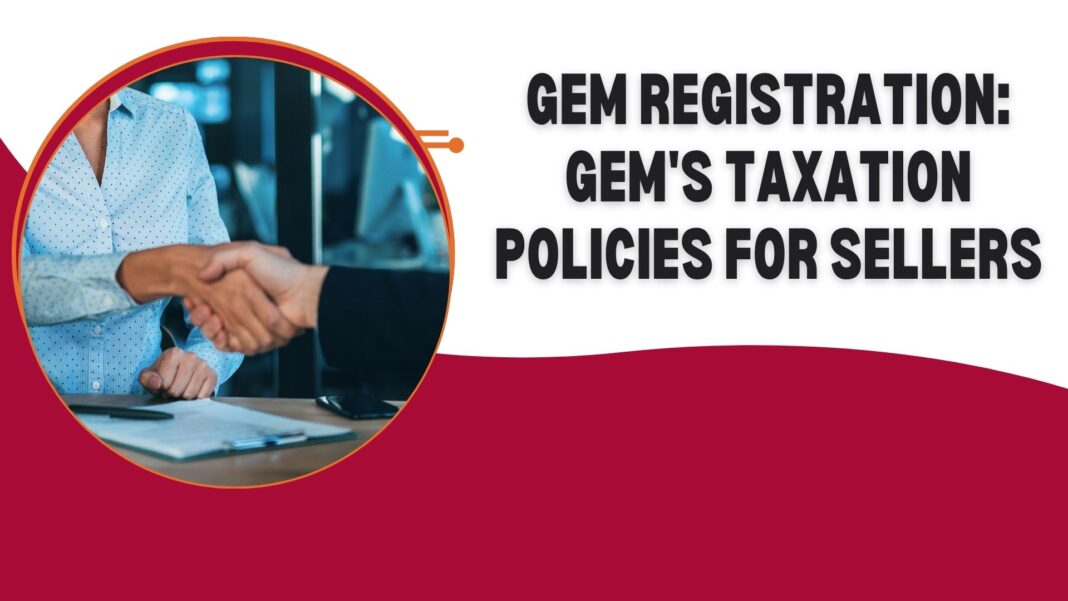Understanding GeM Taxation Policies
Navigating taxation policies on the Government e-marketplace (GeM) can be complex for sellers. GeM Registration, as a platform facilitating procurement for various government departments, adheres to specific taxation regulations to ensure transparency and compliance. Sellers need to grasp these policies to operate seamlessly and avoid any pitfalls.
GST Compliance:
Goods and Services Tax (GST) is a crucial aspect of GeM transactions. Sellers must ensure GST registration and compliance to participate in GeM. Understanding GST rates applicable to different product categories is essential for accurate pricing and invoicing.
TDS (Tax Deducted at Source):
GeM mandates TDS deduction on payments made to sellers. Sellers should comprehend TDS rates and ensure proper documentation to facilitate smooth transactions and avoid penalties.
Exemption Criteria:
Certain products or categories may be exempt from specific taxes or enjoy reduced rates. Sellers should familiarize themselves with exemption criteria to optimize pricing strategies and enhance competitiveness on GeM.
Documentation Requirements:
GeM requires sellers to maintain comprehensive documentation to validate tax compliance. Proper record-keeping of invoices, GST returns, and TDS certificates is imperative to demonstrate adherence to taxation policies.
Strategies for Tax Optimization on GeM
While GeM’s taxation policies are stringent, sellers can adopt certain strategies to optimize tax implications and enhance profitability:
Tax Planning:
Proactive tax planning is crucial to minimize tax liabilities while maximizing profits. Sellers should leverage available exemptions, deductions, and credits to optimize their tax burden within the framework of GeM regulations.
Price Structuring:
Careful pricing strategies can help mitigate the impact of taxes on product margins. Sellers should factor in applicable GST rates and TDS deductions when setting prices to ensure competitiveness without compromising profitability.
Compliance Monitoring:
Regular monitoring of tax compliance is essential to identify and rectify any discrepancies promptly. Sellers should stay updated on changes in tax regulations and adjust their operations accordingly to maintain compliance and avoid penalties.
Engage Tax Professionals:
Seeking assistance from tax professionals or consultants can provide valuable insights and guidance on navigating GeM’s taxation landscape. Tax experts can offer tailored strategies and solutions to optimize tax planning and compliance efforts.
Leveraging GeM’s Taxation Tools and Resources
GeM provides various tools and resources to assist sellers in navigating taxation policies effectively:
Tax Calculator:
GeM offers a tax calculator tool to help sellers determine accurate GST amounts and TDS deductions for their products. Utilizing this tool simplifies pricing decisions and ensures compliance with taxation regulations.
Educational Materials:
GeM’s platform features educational materials, including tutorials, guides, and FAQs, to enhance sellers’ understanding of taxation policies. Sellers can access these resources to stay informed about updates and best practices in tax compliance.
Customer Support:
GeM provides dedicated customer support services to address sellers’ queries and concerns regarding taxation. Sellers can reach out to GeM’s support team for assistance with tax-related issues or clarification on specific taxation policies.
Training Programs:
GeM conducts training programs and webinars focusing on taxation compliance for sellers. Participating in these programs enables sellers to gain in-depth knowledge of taxation regulations and learn practical strategies for navigating tax-related challenges on the platform. GeM conducts training programs and webinars focusing on taxation compliance for sellers. Participating in these programs enables sellers to gain in-depth knowledge of taxation regulations and learn practical strategies for navigating tax-related challenges on the platform.
Improvement and Adaptation
In the dynamic landscape of taxation policies, continuous improvement and adaptation are imperative for sellers on GeM:
Stay Updated:
Taxation regulations undergo frequent changes, necessitating sellers to stay vigilant and updated. Regular monitoring of policy revisions and updates ensures that sellers remain compliant with the latest requirements. GeM conducts training programs and webinars focusing on taxation compliance for sellers. Participating in these programs enables sellers to gain in-depth knowledge of taxation regulations and learn practical strategies for navigating tax-related challenges on the platform.
Feedback Mechanisms:
GeM encourages sellers to provide feedback on taxation policies and their implementation. Leveraging feedback mechanisms enables GeM to refine its taxation framework, addressing sellers’ concerns and streamlining compliance processes.
Collaboration Opportunities:
Collaboration among sellers, tax professionals, and GeM authorities fosters knowledge exchange and mutual support in navigating taxation challenges. Participating in forums, workshops, and industry networks facilitates collaborative learning and problem-solving.
Adaptability:
Flexibility and adaptability are essential traits for sellers to navigate evolving taxation landscapes effectively. Being adaptable allows sellers to swiftly adjust their strategies and operations in response to changes in taxation policies or market dynamics.
Note: Now get the gem catalogue service through the gem portal.
Conclusion: Navigating GeM’s Taxation Landscape
GeM registration offers lucrative opportunities for sellers to engage in government procurement. However, understanding and complying with taxation policies are fundamental for sustained success on the platform. By comprehensively grasping GST compliance, TDS regulations, exemption criteria, and documentation requirements, sellers can navigate GeM’s taxation landscape with confidence. Stay informed, stay compliant, and unlock the full potential of GeM for your business growth.


